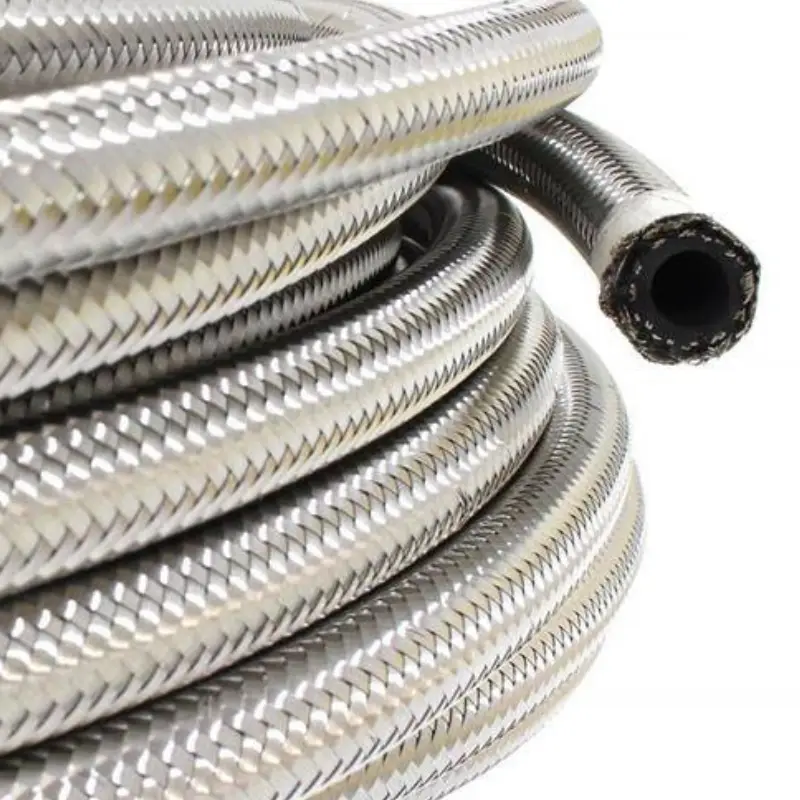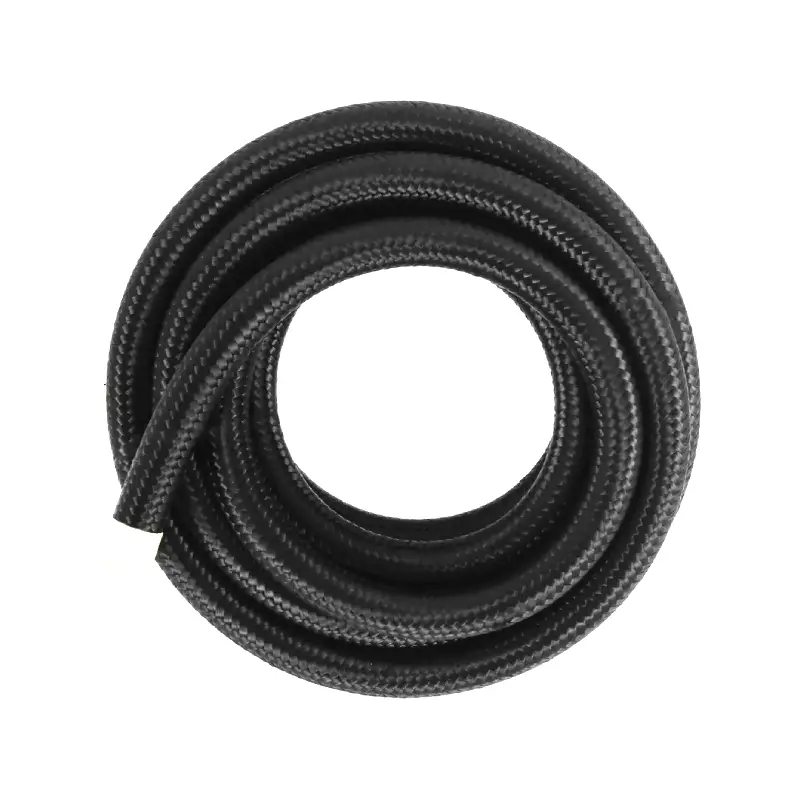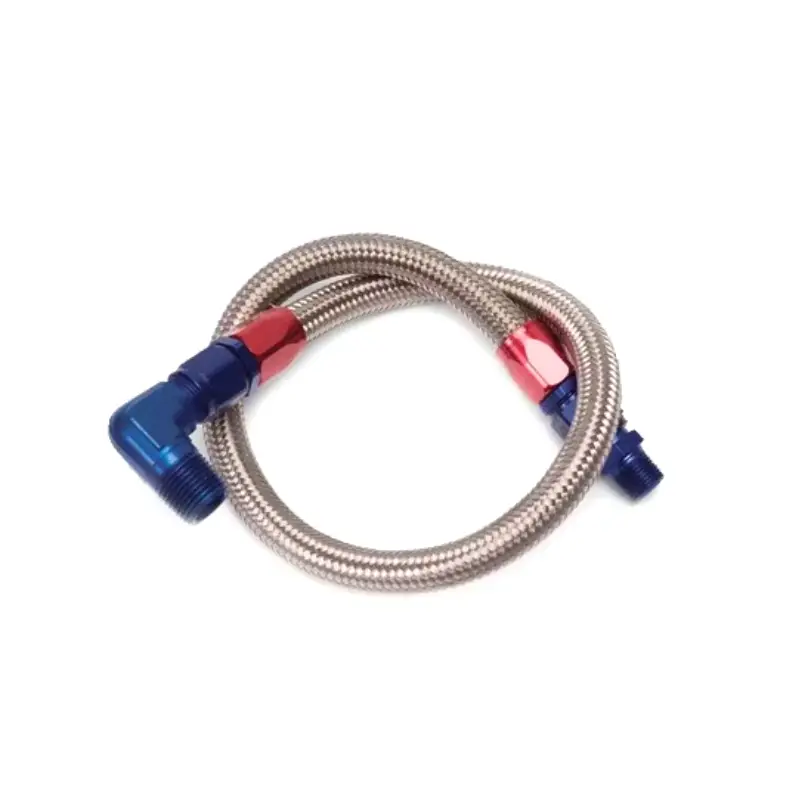Get your desired CPE rubber hose from China, designed for chemical, industrial, and fluid transfer applications. Our hoses provide chemical resistance, durability, and flexibility, ensuring safe and efficient performance. Available in various sizes, lengths, and fittings, we deliver customized CPE rubber hose solutions to meet your specific operational requirements.
Chemical resistance – We use CPE material that resists acids, alkalis, and solvents, ensuring safe fluid transfer in chemical and industrial applications without degradation or leaks.
Durable construction – We design hoses to withstand abrasion, pressure, and environmental factors, providing long-lasting performance in demanding industrial and chemical environments.
Flexibility – We supply hoses that bend easily without kinking, allowing smooth installation and routing in tight or complex piping and machinery layouts.
Custom sizes and fittings – We offer hoses in various diameters, lengths, and connectors, enabling tailored solutions for specific applications and equipment requirements.
Versatile applications – We provide CPE rubber hoses suitable for chemical transfer, industrial fluid systems, and general-purpose operations requiring reliable, safe, and durable hoses.
Delight your clients with our premium wholesale CPE rubber hose. We offer competitive pricing on durable, high-performance hoses, ideal for diverse applications. Our quality ensures client satisfaction, boosting your business. Stock our versatile CPE hoses and provide reliable solutions, building lasting customer relationships.
We tailor the inner diameter to match specific fluid flow requirements, minimizing pressure drop and maximizing efficiency. Wall thickness is adjusted to handle varying pressure levels and prevent bursts or collapses. This customization ensures optimal performance for diverse applications, from low-pressure coolant lines to high-pressure hydraulic systems.
We offer various outer cover materials, including different CPE compounds, to enhance resistance to specific chemicals, abrasion, or UV exposure. Custom colors can be added for identification or aesthetic purposes. This customization protects the hose from environmental damage and improves its visual appeal for specific applications.
We customize reinforcement layers using materials like high-tensile textile braids or steel wire spirals. The number and type of layers are adjusted to meet specific pressure ratings and flexibility needs. This allows us to create hoses that can withstand extreme pressures while maintaining desired flexibility for complex installations.
We provide a wide range of end fittings, including threaded, barbed, and flanged connections, to ensure compatibility with existing systems. Custom assemblies, including pre-formed bends and specific lengths, can be manufactured to simplify installation and reduce the need for on-site fabrication. This customization ensures a perfect fit and seamless integration.
We provide CPE rubber hoses that offer excellent resistance to heat, ozone, and various chemicals. Our hoses are ideal for automotive, industrial, and chemical transfer applications, ensuring reliable performance in demanding environments. With strong flexibility and durability, our CPE rubber hoses deliver long-lasting service and consistent quality for your operations.

We provide CPE rubber with steel braid hoses that deliver superior strength and flexibility for high-pressure applications. The steel braid reinforcement enhances durability and resistance to heat, oil, and chemicals. Ideal for automotive, industrial, and hydraulic systems, our CPE braided hoses ensure long-lasting performance and reliable operation in demanding working environments.

We provide CPE stainless steel nylon braided rubber hoses designed for high performance and durability. These hoses combine chemical-resistant CPE inner tubes with stainless steel and nylon braiding for superior strength and flexibility. Ideal for automotive and industrial use, our hoses ensure reliable performance under high pressure and extreme temperature conditions.

We supply NBR/CPE rubber oil fuel braided rubber hoses designed for superior resistance to oil, heat, and abrasion. These hoses ensure reliable fluid transfer in automotive, industrial, and fuel systems. With strong construction and flexibility, our NBR/CPE braided hoses deliver excellent performance, durability, and safety in high-pressure and demanding operating environments.
A CPE hose is a type of synthetic rubber hose made from chlorinated polyethylene (CPE).
It’s known for its excellent resistance to a wide range of chemicals, oils, fuels, and extreme temperatures, making it suitable for demanding applications in automotive, industrial, and marine environments. CPE hoses are valued for their durability, flexibility, and ability to withstand harsh conditions, often used for fluid and gas transfer.
Choose our CPE hoses for unparalleled performance and reliability. We prioritize quality in every aspect of production, ensuring our hoses deliver exceptional durability and longevity.
Our commitment to customer satisfaction drives us to provide tailored solutions that meet your specific needs.
Here’s why our CPE hoses stand out:
CPE rubber, or chlorinated polyethylene, exhibits a unique combination of properties that make it valuable in various applications. Its key characteristics stem from the chlorination of polyethylene, which enhances its resistance to chemicals and extreme temperatures.
The CPE rubber properties include:
These properties translate to reliable performance in demanding environments. CPE rubber’s versatility allows it to be used in hoses, gaskets, wire and cable insulation, and other applications where durability and resistance to harsh conditions are essential.
The level of chlorination can be adjusted during manufacturing to fine-tune specific properties, allowing for tailored performance in diverse applications.
CPE hoses are widely used across various industries due to their robust properties. Their chemical resistance makes them ideal for handling fuels, oils, refrigerants, and other aggressive fluids. In automotive applications, CPE rubber hoses are commonly found in:
Beyond automotive, CPE hoses are essential in industrial settings for:
CPE Hoses:
CPE and NBR hoses are both widely used in industrial and chemical applications, but they differ in material properties, chemical resistance, and temperature tolerance. Choosing the right hose depends on your specific operational requirements, including fluid type, working environment, and pressure needs for safe and efficient performance.
Material composition – We explain that CPE hoses are made from chlorinated polyethylene, offering strong chemical and weather resistance, while NBR hoses are made from nitrile rubber, providing excellent oil and fuel resistance in industrial systems.
Chemical resistance – We highlight that CPE hoses resist acids, alkalis, and oxidizing agents, making them ideal for harsh chemical environments, whereas NBR hoses excel against oils, fuels, and petroleum-based fluids, supporting reliable fluid transfer in automotive and industrial applications.
Temperature tolerance – We provide that CPE hoses maintain performance in a wide temperature range, suitable for extreme heat or cold, while NBR hoses handle moderate temperatures efficiently, ensuring consistent operation without degradation or leaks.
Durability and flexibility – We note that CPE hoses are flexible and resistant to ozone, UV, and weathering, ideal for outdoor use, while NBR hoses offer toughness and elasticity, handling mechanical stress and repeated bending in industrial setups.
Application suitability – We explain that CPE hoses are used in chemical, water, and corrosive fluid systems, while NBR hoses are ideal for oil, fuel, and hydraulic applications, allowing selection based on specific operational requirements.
When comparing CPE (Chlorinated Polyethylene) and PVC (Polyvinyl Chloride) hoses, the primary distinctions lie in their core chemical makeup, which dictates flexibility, temperature tolerance, and resistance to aggressive fluids. CPE is a synthetic elastomer, often used in performance applications, while PVC is a thermoplastic polymer common in general-purpose and plumbing roles.
Chemical Resistance: CPE hoses generally offer superior resistance to oils, fuels (like E85), and solvents because they are inherently oil-resistant. This makes them ideal for demanding automotive and industrial fluid transfer systems where contact with corrosive media is likely, ensuring better longevity.
Flexibility and Durability: CPE is a naturally flexible elastomer and remains so at low temperatures, making it less prone to cracking or becoming brittle than flexible PVC. PVC requires chemical plasticizers for flexibility, which can leach out over time, causing it to harden and fail.
Primary Application: CPE is primarily used for high-performance, high-pressure fluid transfer, such as braided racing fuel lines, oil cooler lines, and hydraulic systems. PVC is more common for non-critical, low-pressure applications like garden hoses, general-purpose tubing, and rigid pipes (uPVC).
Yes, a CPE hose is generally considered good for oil applications. CPE’s inherent resistance to oils, fuels, and various chemicals makes it a suitable material for handling engine oil, transmission fluid, and other petroleum-based products. This characteristic is why CPE hoses are frequently used in automotive oil cooler lines, oil feed lines, and related systems.
However, the specific suitability of a CPE hose for oil depends on the operating conditions, such as temperature and pressure. While CPE offers good resistance, extreme temperatures or highly corrosive oils might require a more specialized hose material like PTFE or a reinforced CPE hose with enhanced temperature ratings. Always verify the hose’s specifications and compatibility with the intended oil type and operating conditions.
Yes, CPE (Chlorinated Polyethylene) hoses are generally considered compatible with E85 (85% ethanol) and other ethanol-blended fuels, making them a popular and cost-effective choice for performance automotive fuel systems.
The CPE synthetic rubber inner tube is formulated to resist the corrosive and deteriorating effects of ethanol, a property that standard rubber or neoprene hoses lack. This allows the hose to maintain its integrity, flexibility, and pressure rating, providing a reliable fuel line solution for E85 applications, especially for short to medium-term use.
However, while CPE hoses can handle E85, they are known to exhibit some degree of fuel permeation over time, particularly under continuous, high-temperature use. This means a small amount of fuel vapor can pass through the hose material, which can lead to a slight smell of fuel.
For permanent installations, extreme racing applications, or those that prioritize absolute zero permeability, a PTFE (Polytetrafluoroethylene) hose is often considered the superior and definitive long-term solution, as it offers a completely non-permeable inner liner with total chemical inertness, though typically at a higher cost.